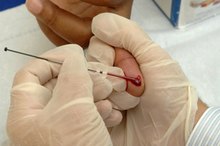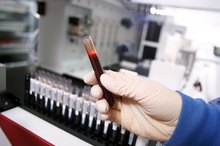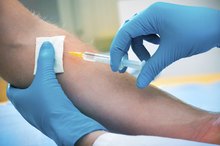What does fact checked mean?
At Healthfully, we strive to deliver objective content that is accurate and up-to-date. Our team periodically reviews articles in order to ensure content quality. The sources cited below consist of evidence from peer-reviewed journals, prominent medical organizations, academic associations, and government data.
- National Library of Medicine: Rh Blood Group
- National Library of Medicine: Rh Blood Group
- Mayo Clinic: Rh Negative Treatments
The information contained on this site is for informational purposes only, and should not be used as a substitute for the advice of a professional health care provider. Please check with the appropriate physician regarding health questions and concerns. Although we strive to deliver accurate and up-to-date information, no guarantee to that effect is made.
What Is the Big E Antibody?
There are currently 30 known blood group types among humans as of March 2010. Of the 30 blood types, the Rh blood group is one of the most clinically important because of the increased risk of health problems. The Rh blood group is composed of 50 known blood antigens, such as D, C, c, E, and e. The “E” antigen, also referred to as the “Big E,” is a particularly strong antigen that poses an increased health risk during childbirth and blood transfusions.
If you are experiencing serious medical symptoms, seek emergency treatment immediately.
Antigens
Antigens are small molecules or substances recognized by the immune system. Individuals typically inherit antigens, or sometimes acquire them during blood transfusions or childbirth. Blood antigens attach to the surface of red blood cells. Scientists categorize blood types based on the type of antigen you have on the surface of your red blood cells. Each antigen has a unique amino acid sequence. Amino acids are small molecules (made of an amine group, carboxylic acids, and a side chain) that make up the chemical building blocks of proteins.
- Antigens are small molecules or substances recognized by the immune system.
- Scientists categorize blood types based on the type of antigen you have on the surface of your red blood cells.
E Antigen
Difference Between O Positive & O Negative Blood
Learn More
The “Big E” antigen is significant because it can cause increased health risks for certain individuals. If an individual has the "E" antigen, he or she will not produce an “anti-E” antibody. In this case, the individual's immune system will tolerate the antigen. However, if the individual does not have the "E" antigen during exposure to it via childbirth or blood transfusion, the individual's immune system may build antibodies against it. This immune system response leads to potential complications such as hemolytic anemia (red blood cell destruction) or infection.
- The “Big E” antigen is significant because it can cause increased health risks for certain individuals.
- If an individual has the "E" antigen, he or she will not produce an “anti-E” antibody.
Blood Transfusions
Individuals with the "E" antigen in their blood can only receive blood transfusions containing type "E negative" blood. Otherwise, the individual may experience a “delayed transfusion reaction.” This results in potentially serious reactions such as allergic responses, infection or hemolysis (degradation of red blood cells).
Pregnancy and Childbirth
About O Positive Blood
Learn More
If a pregnant woman is “E negative” and carries the “E” antibody, there is a risk of health problems during childbirths. This only occurs if the child is born with the “E” antigen, and the mother does not carry the “E” antigen (but does carry an antibody against it). In this situation, the mother’s immune system can attack the newborn’s blood cells during birth (due to blood contamination), leading to hemolytic anemia. This can be fatal for some infants.
- If a pregnant woman is “E negative” and carries the “E” antibody, there is a risk of health problems during childbirths.
- This only occurs if the child is born with the “E” antigen, and the mother does not carry the “E” antigen (but does carry an antibody against it).
Treatment and Prevention
The “Big E” antigen only poses a health risk for individuals during blood transfusions or childbirth. For blood transfusions, patients can avoid complications if the medical professionals accurately match the patient’s blood type to the receiving transfusion blood type.
For childbirth, treatment is only necessary for women carrying the “E” antibody (E negative), whose children will have the “E” antigen (E positive). In this case, the doctor may treat the mother with injections of immunoglobulin serum, which will desensitize the immune system against the antigen. This reduces the risks of complications during childbirth.
- The “Big E” antigen only poses a health risk for individuals during blood transfusions or childbirth.
- For childbirth, treatment is only necessary for women carrying the “E” antibody (E negative), whose children will have the “E” antigen (E positive).
Frequency
According to the National Library of Medicine-National Institute of Health, 29 percent of Caucasians, 22 percent of blacks, and 39 percent of Asians carry the "E" antigen 1. It occurs in both men and women.
Related Articles
References
- National Library of Medicine: Rh Blood Group
- eMedicine: Rhesus Blood Groups
- Mayo Clinic: Rh Negative Treatments
- InformedHealth.org Institute for Quality and Efficiency in Health Care (IQWiG). How does the immune system work? Updated April 23, 2020.
- Auladell M, Jia X, Hensen L, et al. Recalling the future: Immunological memory toward unpredictable influenza viruses. Front Immunol. 2019;10:1400. doi:10.3389/fimmu.2019.01400
- Scohy A, Anantharajah A, Bodéus M, Kabamba-Mukadi B, Verroken A, Rodriguez-Villalobos H. Low performance of rapid antigen detection test as frontline testing for COVID-19 diagnosis. J Clin Virol. 2020;129:104455. doi:10.1016/j.jcv.2020.104455
- Jackson LA, Anderson EJ, Rouphael NG, Roberts PC, Makhene M, Coler RN, McCullough MP, Chappell JD, Denison MR, Stevens LJ, Pruijssers AJ, McDermott A, Flach B, Doria-Rose NA, Corbett KS, Morabito KM, O'Dell S, Schmidt SD, Swanson PA 2nd, Padilla M, Mascola JR, Neuzil KM, Bennett H, Sun W, Peters E, Makowski M, Albert J, Cross K, Buchanan W, Pikaart-Tautges R, Ledgerwood JE, Graham BS, Beigel JH; mRNA-1273 Study Group. An mRNA vaccine against SARS-CoV-2 - Preliminary report. N Engl J Med. 2020:NEJMoa2022483. doi:10.1056/NEJMoa2022483
- Sahu S, Hemlata, Verma A. Adverse events related to blood transfusion. Indian J Anaesth. 2014;58(5):543-51. doi:10.4103/0019-5049.144650
Writer Bio
Benjamin Routh has been an entrepreneur and freelance writer since 2007. His work has appeared on sites such as Ezinearticles.com, Helium.com, and more. He attended East Tennessee State University from 2003-2007, where he majored in accounting and general studies.








